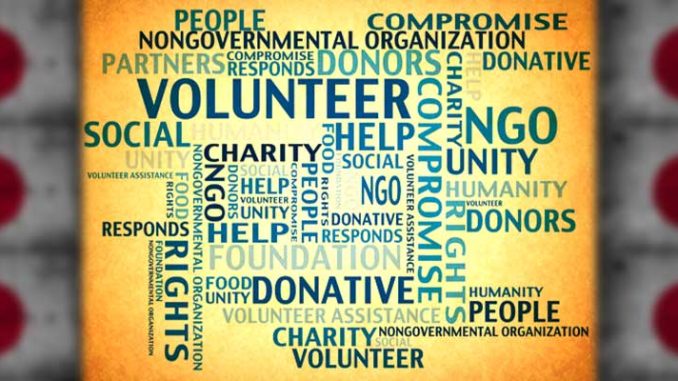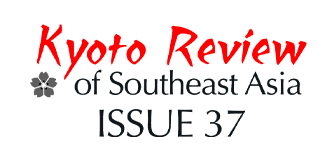
Kyoto Review recently talked with Ms. Aoki Reiko about problems faced by migrants and the Japanese laws that affect them. Aoki works with two NGOs in Japan’s Kansai region: Asian People Together, an affiliate of the Kyoto YWCA and the Center for Health and Rights of Migrants (CHARM) in Osaka. This article is based largely on our conversation. For further information, see the website of Solidarity Network with Migrants Japan (Japanese, English, Korean, and Tagalog): http://www.migrants.jp/v1/English/English.html
Legal Protection for Whom?
Asian People Together was formed in 1995 to “surface the reality of trafficking” of women to Japan and the fact that Japanese laws do not protect its victims. Its goal is to see the passage of an anti-trafficking law by the Japanese Diet such as exists in other industrialized nations. In December 2002, Japan signed the UN Convention against Transnational Organized Crime and the UN Protocol to Prevent, Suppress and Punish Trafficking in Persons, Especially Women and Children. Since then, the Japanese government has argued – as it did after signing the earlier Convention on the Rights of the Child – that its existing laws fulfill its obligations. Yet the enforcement of Japanese law is aimed at protecting society and businesses rather than victims of trafficking and forced prostitution.Many of the acts inflicted on trafficked migrants are illegal – confinement, abduction for profit, forced labor, forced indecency, rape, offset in debt, and making others sell sex, to name a few – yet the laws most commonly enforced are Anti-Prostitution Law Article 5 (Solicitation) and Immigration Law Articles 27-55, effecting the deportation of illegal aliens. Further, since September 2001, the Convention against Transnational Organized Crime is being deployed primarily against perceived terrorist threats.
Prostitution is illegal in Japan, although it is defined narrowly as “sexual penetration.” This leaves a wide range of sexual services that can be sold legally and more or less openly as “Korean massage,” “Taiwan massage,” “aesthetic salon,” “soap land,” etc., under Japan’s Business Entertainment Law. Strip theaters, love hotels, adult video rooms, snack bars, and the like are required to register and are restricted in their area and hours of operation, hiring and access of minors, and advertising.
In eating establishments serving alcohol – the bars and snack bars where many migrants work as hostesses – there is a continuum between strict hostessing and outright prostitution. It is impossible to draw a line between the legal and illegal, the voluntary and the coerced. In the practice of dohan, for example, hostesses are expected to bring their own business into the bar nightly and they receive higher commissions for regular customers. Because women on “entertainer” visas are not paid any wages until the end of their 6-month contract (in violation of Japanese labor law), they are wholly reliant on commissions. How they earn them is not specified by the bar owner, but the practice obviously encourages, if not coerces, the provision of sexual services.
Conditions of employment further the effective combination of physical and psychological coercion. Workers’ passports are routinely confiscated upon arrival, at which time women are informed that they are 4-6 million yen in debt. They are housed and overseen at all times by employers, and threats discourage them from trying to leave their employer or the country. Holding a woman’s passport does not in fact prevent her from leaving Japan, as embassies will reissue a stolen passport. But most women don’t know this, the type of visa they have, or its dates of validity. (For further details, see the transcript of the International Symposium on Trafficking of Women to Japan, 22 January 2003, http://www.ajiazaidan.org/english/forums/22-1-2003/).
Asian People Together convened international lawyers and others to investigate these legal and social realities, producing a book documenting the dynamic between sending countries Columbia, the Philippines, and Thailand, and receiving country Japan. This publication, 人身売買と受け入れ大国ニッポン (Trafficking in human beings and Japan as a major receiving country), by Fanny Polania Molina, Saito Yuriko, Aurora H. De Dios, Yoneda Masumi, and Aoki Reiko (Akashi Shoten, 2001) documents case studies and international and domestic laws, and proposes a domestic anti-trafficking law in Japan.
Barriers to the passage of such a law and the enforcement of existing laws to protect victims of trafficking include discrimination against developing country foreigners and against women in the sex industry specifically. This attitude is complicated by moral disapproval of those thought to be seeking “easy money.”
Trafficking from Thailand and the Philippines
The trafficking of women from Thailand is conducted by a system whereby local recruiters manage immigration procedures and receivers in Japan deliver women to brokers who arrange their employment. Before 1991, Filipino migration was much the same, as connections between Japanese yakuza and local recruiters brought women to Japan on tourist visas. But that year, a Filipina entertainer named Maricris Sioson died of multiple stab wounds and traumatic head injuries, provoking a change in Philippine government policy. (See Filipino Women’s Diaspora: Causes, Costs and Challenges, BATIS Center for Women, Manila, 1995. batis@pacific.net.ph)
Now the whole process is much more open and highly organized. Most Filipinas enter Japan legally with an “entertainer visa” vetted by the Philippine government (which takes a fee). Recruiters advertise and “train” women to qualify as performing artists. The argument behind the open process is that the consulate can assist overseas workers who are part of the legal system. This it does to a limited extent, but openness does not afford any more real protection to Filipinas than is available to Thais and Chinese who commonly overstay on tourist or student visas or contract a fake marriage.
Access to Social Services
Aoki, who earned an MA at the Asian Social Institute in the Philippines, also works with Osaka’s Center for Health and Rights of Migrants. CHARM serves the health needs, especially reproductive and sexual health, of vulnerable immigrant women. Access to health care is a big problem for those without resources in Japan, and a complicating factor for many is lack of legal status. This may be true even for long-term residents married to Japanese men, if they are in an unregistered second marriage.
To enable women with neither visa nor money to receive medical treatment, CHARM has developed a network of health institutions in the Kansai region (Osaka-Kyoto-Kobe). It works with medical doctors and local universities that offer degrees in social work, which send students for practical experience. Because the NGO is small, it targets specific ethnic communities – Filipino, Thai, and Peruvian – to develop leadership capacity among their longterm residents. These are women who already have good Japanese language skills; with a little knowledge of the workings of the welfare and medical systems, they can become valuable resource persons.
A related and growing problem is the legal status of immigrants’ children born in Japan. Because contraception is not readily available to sex industry workers, unwanted pregnancies are common. If a birth is registered with neither a foreign consulate nor the Japanese state – the latter being impossible in the case of an unregistered marriage or if both parents are immigrants without legal status – the child is rendered legally “stateless.” Fortunately for long-term residents, most school boards will accept such children at their parents’ request. But if such a child is abandoned, as can happen when unregistered marriages end or the father is absent and the mother returns home alone, the child remains stateless, is ineligible for adoption, and is usually confined to state institutions until adulthood.
In a recent trend, a growing number of illegal migrants – reportedly up to 10 percent in 2002 – are applying for and receiving alien registration certificates to improve their access to social services. Although local authorities must then inform the Immigration Bureau of their status, that body says it is “not prepared to find and deport so many people.” The Bureau also tacitly accepts that those who register “are rather deeply rooted in Japanese society,” according to one Immigration official (Asahi Shimbun English edition, 16 July 2003).
But the need remains great and is not adequately addressed by existing social service policy. For example, government HIV testing in Osaka is available only on weekdays from 9 to 11 a.m., a highly inconvenient time for sex workers. Women’s shelters and other such services are available only in cities, while the sex industry and immigrant sex workers are present in every small town with a hotspring.
CHARM does supplementary HIV testing and runs a reproductive health telephone hotline with funding from the Osaka City and Osaka Prefecture Infectious Diseases Department. In fact, the Japanese government is coming to rely on private networks like this one to provide more flexible and gap-filling services and smaller shelters. But at the same time, its attitude toward NGOs and NPOs is only slowly evolving. Citizens’ groups are typically seen as “volunteers,” rather than as sorely needed professional partners in managing Japan’s quickly changing society.
Kyoto Review
Kyoto Review of Southeast Asia. Issue 4 (October 2003). Regional Economic Integration
